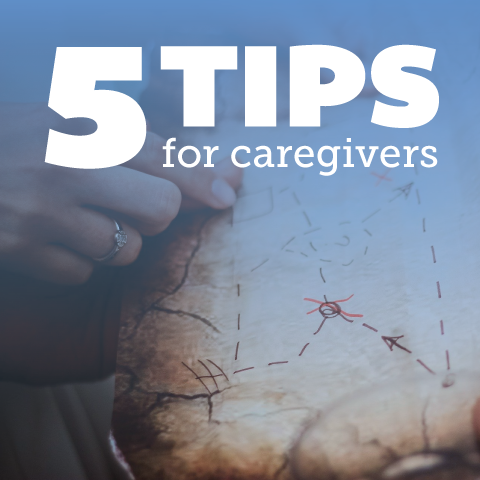
5 Tips for Getting Started...
AKA Caregiver Bootcamp!
When a family member receives a diagnosis of dementia, it’s a huge puzzle to piece together. Our first thoughts usually focus on the person: How can we help them? How quickly might they progress? What kind of care are they going to need? But this is just the start of the puzzle; we often overlook the crucial caregiving piece! The family caregiver’s role is of vital importance. Caregivers have to take on many new roles— doctor, lawyer, financial planner, and caretaker—often not knowing where to start. Here are 5 tips for starting to build your caregiving skills.
Playing Doctor: Understanding medical needs
A good first step as a caregiver is to familiarize yourself with your loved one’s diagnosis. There are many different forms of dementia that all affect the brain in different ways. The progression of the disease and symptoms displayed will be somewhat different, even between the common forms: Alzheimer’s disease, vascular dementia, Lewy Body dementia, or Frontotemporal dementia. However, unless you’re looking for a new hobby, you by no means need to become an expert in all of the minute details in all of these types of dementia. The goal is to get an idea of what’s normal. If your doctor prescribes your loved one any medications, ask about common side effects. Learn more about other medical conditions that might become common with dementia (urinary tract infections are one!). The New England Journal of Medicine doesn’t have to become your nighttime reading, but knowing what’s normal—and what’s not!—will help you know when it’s time to make that doctor’s appointment or seek medical attention.
Beyond Medical Needs: Understanding the dementia experience
You know the old saying about “you won’t understand until walking a mile in their shoes”? It’s both completely true in this circumstance, but almost impossible to do. If you take some time to read up on their diagnosis, you’ll get an idea of what’s normal for their disease. The problem? We’re all different! We have different memories, moods, and behaviors to begin with, which makes it difficult to understand completely how the disease may be affecting your loved one. But if you know what’s normal for the disease, and what’s normal for them (have they always had that terrible sense of humor?), then you can begin to understand their experience. Perhaps you’ve noticed they’re having word finding difficulties, and your “life-of-the-party” loved one has become more reserved. They may be feeling self-conscious, embarrassed to speak, or afraid of making a mistake. Rather than just getting frustrated that they don’t want to socialize, take a step back to look at the situation. Talk to your loved one, and maybe they’d prefer smaller or shorter gatherings to feel comfortable. Remember that these changes in memory, moods, and behaviors are because of the disease, and not the fault of your loved one. If you only remember one thing, keep this in mind to help keep your loved one’s behaviors in perspective.
Playing Lawyer: Addressing legal needs
As much as the thought of wills and powers of attorney may make your head spin, now is the time to address your legal needs. The good news? You don’t have to write these documents yourself! But you do have to prioritize your wishes. Think about your goals and desires for you and your loved one. Do you have a strong preference about where you live? Or maybe your loved one has strong opinions on health issues. Talk about these preferences and priorities now, especially if your loved one is still in the early stages of the disease process. Getting their input in this stage is especially important, so you can ensure you help fulfill their wishes down the road. Once you’ve established your priorities, you can meet with an attorney to draft the proper wills, powers of attorney, or medical directives as needed to help you both satisfy your goals.
Playing Financial Planner: Paying for long-term care
From a caregiver prospective, playing financial planner is a lot like playing lawyer. Your main objective is to prioritize your goals. This may be a similar (or the same!) conversation, but this time with a financial lens. Is your goal to remain in your home? Do you have children to provide for? Would you prefer a low-maintenance retirement community for your future years? Think about what you would like to accomplish with your resources. With these goals in mind, you may want to do some research (how much does that retirement community cost?), or you may want to skip ahead and reach out directly to a financial planner. The financial planner can help you prepare for these costs, and consider options, such as long term care insurance, or if Medicaid could be helpful.
Don’t forget the last piece: You!
When you’re juggling all these puzzle pieces, the last person you think about is yourself—the caregiver. However, we could certainly argue that you are the most important piece! Who else is going to play doctor, caretaker, lawyer, and financial planner for the family? These roles are all incredibly important, but so is taking care of yourself. Find some time for respite. Perhaps your loved one still enjoys going to lunch with a friend? Ask them to make it a weekly date so you can have time to run errands, get a haircut, or just relax! If you’re still working, or need more hours in the day, Adult Day Health Centers are also a valuable resource to provide care for your loved one, while you have time for yourself. Creating some time for yourself ensures that you can jump back into your caregiving role as the need arises.
Want to learn more? Join us for our next Caregiver Bootcamp, Saturday, September 25th!
Blog
"I like that IMCC focuses on dementia-related problems and provides a focal point for families to network and socially interact in coping with dementia. It provides a community that helps us in our struggle."




